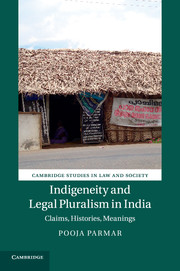Crossref Citations
This Book has been
cited by the following publications. This list is generated based on data provided by Crossref.
2015.
Opposing the Rule of Law.
p.
318.
2015.
BOOKS RECEIVED.
The Cambridge Law Journal,
Vol. 74,
Issue. 3,
p.
643.
Hammoudi, Ali
2016.
The conjunctural in international law: the revolutionary struggle against semi-peripheral sovereignty in Iraq.
Third World Quarterly,
Vol. 37,
Issue. 11,
p.
2028.
2016.
Criminal Defense in China.
p.
201.
2016.
A Sociology of Transnational Constitutions.
p.
521.
Mawani, Renisa
2016.
Law, Settler Colonialism, and “the Forgotten Space” of Maritime Worlds.
Annual Review of Law and Social Science,
Vol. 12,
Issue. 1,
p.
107.
2017.
The Politics of Bureaucratic Corruption in Post-Transitional Eastern Europe.
p.
215.
2017.
Duties to Care.
p.
259.
2018.
Children as ‘Risk'.
p.
357.
Vevaina, Leilah
2018.
She's Come Undone: Parsi Women's Property and Propriety under the Law.
PoLAR: Political and Legal Anthropology Review,
Vol. 41,
Issue. 1,
p.
44.
2019.
Genocide Never Sleeps.
p.
219.
O’Donnell, Erin
2020.
Rivers as living beings: rights in law, but no rights to water?.
Griffith Law Review,
Vol. 29,
Issue. 4,
p.
643.
O'Donnell, Erin
Poelina, Anne
Pelizzon, Alessandro
and
Clark, Cristy
2020.
Stop Burying the Lede: The Essential Role of Indigenous Law(s) in Creating Rights of Nature.
Transnational Environmental Law,
Vol. 9,
Issue. 3,
p.
403.
2020.
Transnational Legal Ordering of Criminal Justice.
p.
386.
Ruiz-Tagle, Pablo
2021.
Five Republics and One Tradition.
Ramakrishnan, Abhilasha
2021.
Groundwater Law and Management in India.
p.
31.
2021.
Shari‘a, Inshallah.
p.
363.
2021.
Rule of Law Intermediaries.
p.
255.
2021.
Five Republics and One Tradition.
p.
306.
2021.
The Archival Politics of International Courts.
p.
227.



